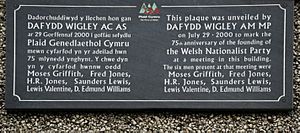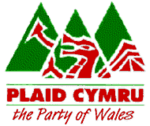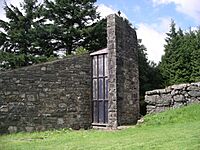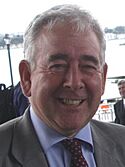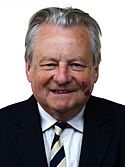History of Plaid Cymru facts for kids
Quick facts for kids
Plaid Cymru – The Party of Wales
|
|
|---|---|
 |
|
| Leader | |
| Chairman | Alun Ffred Jones |
| Chief Executive | Rhuanedd Richards |
| Honorary President | Dafydd Wigley |
| Founded | 5 August 1925 |
| Headquarters | 18 Park Grove, Cardiff, CF10 3BN Wales |
| Ideology | Welsh independence Social democracy |
| Political position | Centre-left |
| European affiliation | European Free Alliance |
| International affiliation | none |
| European Parliament group | Greens-EFA |
| Colours | Green and yellow |
| Website | |
| www.plaid.cymru | |
Plaid Cymru (pronounced plyde KUM-ree), often called Plaid, is a political party in Wales. It started in 1925 after a meeting at a big Welsh festival called the National Eisteddfod. People from two Welsh nationalist groups decided to create a "Welsh party" to focus on Wales's future.
The party was first called Plaid Genedlaethol Cymru, which means the National Party of Wales. It brought together people with different political views, from left to right. Its main goals were to promote the Welsh language and to gain political independence for Wales.
While Saunders Lewis is often seen as the founder, some historians say that the ideas of D. J. Davies were very important in shaping the party's long-term beliefs.
Plaid Cymru has been involved in many important events in Welsh history. These include protests like Tân yn Llŷn (Fire in Llŷn) in the 1930s, which led the party to adopt a peaceful approach. They also protested against the flooding of Capel Celyn in the 1950s.
Later, Gwynfor Evans became the first Plaid Cymru Member of Parliament (MP) in 1966. The party also helped pass the Welsh Language Act of 1967. Gwynfor Evans even went on a hunger strike in 1981 to get a special Welsh-language television channel.
Today, Plaid Cymru is the third largest political party in Wales. It holds 11 out of 60 seats in the Senedd (the Welsh Parliament). It has also been part of the Welsh government in the past, working with Welsh Labour from 2007 to 2011.
Contents
Starting the Party in 1925
People had been talking about needing a "Welsh party" since the 1800s. Wales was becoming more aware of its own identity. Important Welsh institutions like the National Eisteddfod (a cultural festival) and the University of Wales were created. By 1924, many people in Wales wanted their nationality to be the main focus of Welsh politics.
After the First World War, many European countries gained independence. There was also the Easter Rising in Ireland, which inspired some in Wales. However, in the UK elections of the early 1920s, Welsh issues were not a big focus. By 1925, unemployment in Wales was very high, and a long period of economic hardship began.
In this situation, two groups, the Welsh Home Rulers and the Welsh Movement, decided to meet. Important people like H. R. Jones, Saunders Lewis, Lewis Valentine, and D.J. Williams were there. Their main goal was to create a Wales where Welsh was spoken by everyone. They agreed that all party meetings would be in Welsh, and members would not be part of any other British political parties.
In 1911, about 43.5% of people in Wales spoke Welsh. This was a decrease from earlier years. Saunders Lewis felt that the old "Welsh nationalism" was not strong enough. He believed the party's existence itself showed that Wales was unique.
In its early years, the party published a monthly newspaper called Y Ddraig Goch (The Red Dragon). They also held a summer school every year. In the 1929 election, Lewis Valentine got 609 votes. These early supporters later became famous as 'the Gallant Six Hundred' in a popular song.
By 1932, the party also wanted self government for Wales and for Wales to be represented at the League of Nations. However, these ideas did not make the party popular beyond a small group of Welsh-speaking thinkers.
Lewis's Ideas (1926–1939)
Between the two World Wars, Plaid Cymru was more successful as a group that pushed for social and educational changes than as a political party. Saunders Lewis, who was party president from 1926 to 1939, believed the party's main goal was to help Welsh people feel proud and remove "the mark and shame of conquest." He wanted to show how Welsh culture was connected to the wider European civilisation.
Lewis, who believed in having a king or queen, said that "Civilisation... must have a local habitation and name. Here its name is Wales." He also wanted to help Welsh-speaking communities thrive. He didn't like both capitalism and socialism. Instead, he promoted an idea called perchentyaeth, which meant sharing property more widely among people.
Welsh Language Campaigns
When radio broadcasting started in Wales, Plaid Cymru protested because there weren't enough Welsh-language programmes. They even encouraged people not to pay their TV licence fees. This pressure worked, and by the mid-1930s, more Welsh programmes were broadcast. A special Welsh regional broadcasting channel was set up in 1937.
The 1931 census showed that the number of Welsh speakers had dropped to 36.8% of the population. Some areas like Anglesey and Ceredigion still had many Welsh speakers, but others like Radnorshire and Monmouthshire had very few.
The Tân yn Llŷn Protest in 1936
In 1936, the UK government decided to build a bombing school at Penyberth on the Llŷn Peninsula in Wales. This caused a huge protest known as Tân yn Llŷn ("Fire in Llŷn"). The government had tried to build similar schools in England, but faced protests there too.
UK Prime Minister Stanley Baldwin refused to listen to the Welsh people, even though half a million Welsh protesters signed a petition. Saunders Lewis said that the government was turning a place important for Welsh culture and language into a place for "barbaric warfare." The building of the school started exactly 400 years after laws that joined Wales with England.
On 8 September 1936, the bombing school building was set on fire. Saunders Lewis, Lewis Valentine, and D. J. Williams said they were responsible. Their trial in Wales couldn't decide a verdict, so the case was moved to London. The "Three" were sentenced to nine months in prison. When they were released, 15,000 Welsh people welcomed them as heroes in Caernarfon.
Many Welsh people were angry because the judge in London treated the Welsh language with disrespect. They were also upset that the trial was moved to London and that Saunders Lewis was fired from his job before he was found guilty. This event was a big moment for Welsh nationalism.
During World War II (1939–1945)
During the Second World War, the UK government was careful not to upset Welsh nationalists. Clement Attlee, a government minister, worried that Welsh nationalists might be against the war effort. To find out who had anti-war feelings, Welsh-speaking soldiers were sometimes put into Welsh-speaking army units to report on others.
The government also thought about sending a member of the British Royal Family to Wales to calm things down. They even considered making Princess Elizabeth the Constable of Caernarfon Castle. However, these plans were dropped.
Some UK officials called Welsh nationalists "Bards under the bed," suggesting they were secretly causing trouble. However, this was not true. Many Plaid Cymru members actually served in the British armed forces. For example, Ambrose Bebb, a founding member, strongly supported the war against Nazi Germany.
Plaid Cymru officially remained neutral about the Second World War. They believed Wales, as a nation, should decide its own stance on war. They also felt that no other nation had the right to force Welsh people to fight in its army. Saunders Lewis hoped that many Welshmen would refuse to join the British Army.
Lewis, who had fought in the First World War, was not against the military. He and other party members wanted to strengthen loyalty to the Welsh nation over loyalty to the British state. Most party members who refused military service did so because of their moral or religious beliefs, not just political ones.
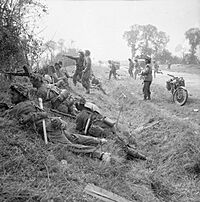
University Election in 1943
Before 1950, universities elected their own representatives to the UK Parliament. In 1943, Saunders Lewis ran for the University of Wales seat. He lost to William John Gruffydd, a former party member who had joined the Liberal party.
Even though Lewis lost, this election was important for Plaid Cymru. It helped the party be taken more seriously as a political force. The campaign also led to a "considerable growth" in the party's membership.
Gwynfor Evans's Time (1945–1981)

After Saunders Lewis stepped back from direct politics, Gwynfor Evans became party president in 1945. Evans learned Welsh as an adult and was a strong Christian pacifist. He was not forced to join the army during World War II because of his beliefs.
Under Evans, Plaid Cymru put forward more candidates in elections. By 1945, the party was in a much stronger position. In response to growing Welsh nationalism, the UK government set up the Council of Wales in 1948. This group advised the government on Welsh issues, but it had no real power, which frustrated many.
After the war, Plaid Cymru protested against the UK government using Welsh land for military training. They also pushed for a Welsh parliament. While they didn't get a full assembly at first, the government made some small changes. They created a Minister of Welsh Affairs in 1951, started publishing Welsh statistics, and in 1955, Cardiff was officially recognised as the capital of Wales.
Evans also worked to get more Welsh-medium education at universities. By 1955, the University of Wales started offering more courses in Welsh. Plaid Cymru also began attracting members from other parties.
The Flooding of Capel Celyn
In 1956, Liverpool City Council wanted to build a water reservoir in the Tryweryn Valley in Wales. This meant flooding Capel Celyn, a Welsh-speaking village with a lot of history. Even though almost all Welsh politicians (35 out of 36 MPs) were against it, the plan was approved in 1957.
Gwynfor Evans protested in Liverpool and was even removed by police. The flooding of Capel Celyn greatly increased support for Plaid Cymru in the late 1950s. The fact that Welsh opposition couldn't stop the plan showed many people that Wales had little power. This event also pushed for more devolution (transfer of power) to Wales.
The flooding also made Plaid Cymru members think more about using direct action. While the party focused on legal ways to stop the project, they also understood why some members tried to damage the dam's power supply in 1962. When the Llyn Celyn reservoir opened in 1965, Plaid Cymru organised a large protest.
In 2005, the Liverpool City Council officially apologised for flooding Capel Celyn.
Tynged yr Iaith and the 1961 Census
In 1962, Saunders Lewis gave a famous radio speech called Tynged yr iaith (The Fate of the Language). He warned that the Welsh language would die out if people didn't act. Lewis wanted Plaid Cymru to do more to promote the language. This speech led to the creation of Cymdeithas yr Iaith Gymraeg (the Welsh Language Society) later that year. This allowed Plaid Cymru to focus on elections, while the Society focused on promoting the language.
Lewis gave his speech because the 1961 census showed that the number of Welsh speakers had dropped to 26%. In response to calls for Welsh devolution, the Labour Government created the Welsh Office and a Secretary of State for Wales in 1964.
Evans Becomes an MP in 1966
While Plaid Cymru was disappointed in the 1966 UK general election, the 1966 Carmarthen by-election on 14 July 1966 was a huge success. Gwynfor Evans was elected, becoming the first ever Plaid Cymru MP. This was a very important moment for the party.
Plaid Cymru also did very well in two other by-elections in 1967 and 1968, almost winning. These results were partly due to people being unhappy with the Labour government. Plaid Cymru also argued that Labour's policies were harming small Welsh communities.
The Welsh Language Act of 1967
With Plaid Cymru's election successes, the idea of devolution for Wales became a big topic again. By 1967, the Welsh Language Act 1967 was passed. This law gave some legal protection for using Welsh in official government business. Before this Act, only English could be used in government and court proceedings. The Act was based on a report that suggested Welsh should have equal status in speech and writing.
The 1979 Referendum and Hunger Strike for S4C
In the 1970 United Kingdom general election, Plaid Cymru ran candidates in every seat in Wales for the first time, and their vote share increased a lot. Gwynfor Evans lost his Carmarthen seat, but won it back in October 1974. He then started a campaign for a Welsh-language television channel because he was worried about the decline in Welsh speakers.
Plaid Cymru led the Yes Campaign for devolution in Wales. A referendum was held on 1 March 1979, but the people of Wales voted against setting up a Welsh Assembly. Only 12% of voters supported the idea. After this defeat, many in the party questioned its future direction.
After the referendum, the UK government said they would not create a Welsh-language television channel. This made many people in Wales very angry. In early 1980, over two thousand Plaid Cymru members said they would go to prison rather than pay their TV licence fees. Then, Gwynfor Evans announced he would fast to death if a Welsh-language channel was not created. The government gave in, and the Welsh Fourth Channel (S4C) was launched on 2 November 1982.
Wigley and Elis-Thomas as Presidents (1981–2000)
Dafydd Wigley, an MP for Caernarfon, became president in 1981. The party's spirits were low after the referendum defeat. In 1981, the party adopted "community socialism" as a goal. This meant they wanted a more local, decentralised socialist state.
Wigley resigned in 1984 due to his children's health. Dafydd Elis-Thomas was then elected president, moving the party more to the political left. Wigley returned as president in 1991 after Elis-Thomas resigned.
The 1991 census showed that the number of Welsh speakers had stopped declining and remained at 18.7% of the population.
The Yes for Wales Campaign
After the 1997 United Kingdom general election, the new Labour government wanted a Welsh Assembly that would be more accountable to the people. Plaid Cymru joined a campaign called Yes for Wales, working with the Labour and Liberal Democrat parties.
A second referendum was held on 18 September 1997. This time, voters approved the creation of the National Assembly for Wales by a small majority. The next year, the Government of Wales Act 1998 was passed, officially setting up the Assembly.
First Welsh Assembly (1999–2003)
In the 1999 National Assembly for Wales election, Plaid Cymru gained seats in areas that usually voted Labour. They got their highest share of the vote ever in a Wales-wide election. Ieuan Wyn Jones led their campaign. Plaid Cymru did well partly because of problems within the Labour Party at the time. Dafydd Elis-Thomas was elected as the Presiding Officer (like a speaker) of the Welsh Assembly.
Ieuan Wyn Jones's Presidency (2000–2003)
In 2000, Cynog Dafis, a Plaid Cymru Assembly Member, called for a new Welsh-language movement. He felt that the Welsh language's needs were not being met by the Assembly. He wanted a strong plan to make using Welsh "attractive, exciting, a source of pride and a sign of strength."
However, Lord Elis-Thomas disagreed. He said there was enough goodwill to protect the language's future and that a new Welsh language act wasn't needed. These comments caused some controversy.
Dafydd Wigley resigned as president in late 2000. Ieuan Wyn Jones was then elected President of Plaid Cymru. He reorganised the party leadership. During this time, the party moved more towards the political centre.
Plaid Cymru and the Scottish National Party (SNP) had worked together since the 1980s. In 2001, they made their relationship official by creating the Celtic Alliance. This group became the third largest opposition voting group in the UK Parliament.
Llandudno Party Conference At the Plaid Cymru party conference in Llandudno in 2002, Ieuan Wyn Jones called for the Welsh Assembly to have more power, similar to Scotland's parliament. He also spoke against any military action in Iraq, saying it would make the Middle East unstable. Jones also criticised health and public services policies.
 | Emma Amos |
 | Edward Mitchell Bannister |
 | Larry D. Alexander |
 | Ernie Barnes |


